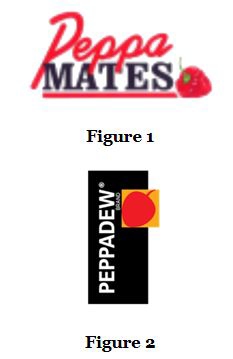In Dinnermates (Tvl) CC v Piquante Brands International,(1) the Supreme Court of Appeal had to consider when a descriptive mark is not a descriptive mark.
Facts
The matter was an appeal against the full court's decision to uphold an opposition against the registration of the appellant's trademark PEPPAMATES (Figure 1) in view of the respondent's registered trademark PEPPADEW (Figure 2), on the basis of Section 10(14) of the Trademarks Act (194/1993).
Section 10(14) concerns marks which are:
- identical or similar to an existing registered trademark;
- filed in respect of the same or similar goods or services; and
- likely to deceive or cause confusion in the marketplace.
Both marks were filed in device format.
The respondents contended that the dominant element of each mark (ie, 'peppa') was a distinctive element, as it did not appear in the dictionary (although the word 'peppadew' did, albeit with the trademark symbol). The respondents thus maintained that their trademark had two distinctive elements:
- the word 'peppa'; and
- a side view of a single rounded pepper and stalk device.
First-instance decisions
Both the court a quo and the full court upheld the respondents' contention that there was a high degree of similarity between the marks, such that when the words 'dew' and 'mates' were removed, there was a likelihood of confusion or deception.
However, the appellant argued that the word 'peppa' was in common use and merely a variation of the word 'pepper'. It thus could not be considered distinctive or invented in respect of foodstuffs in general. In addition, 'peppa' appeared as a word or element in other trademark registrations, some of which pre-dated the respondents' marks. Further, the elements 'mates' and 'dew' could not simply be discarded or ignored, as they served to differentiate the respective marks.
Further, the appellant argued that the respondents' device was simply a descriptive rendering of a sweet piquante pepper. As such, the court and the full bench had effectively granted the respondents a monopoly in respect of a descriptive pepper device coupled with a descriptive word or element. This was analogous to, for example, a supplier of grapes being unable to use a bunch of grapes as a device alongside its name and trademark.
Supreme Court of Appeal decision
The Supreme Court of Appeal held that granting a monopoly in respect of the word or prefix 'peppa' would, in effect, lead to the absurdity of including use of the word 'pepper', which was in common usage. Even ordinary words such as 'peppermint' could be affected by the monopoly.
In the seminal and oft-quoted Plascon-Evans Paints Ltd v Van Riebeeck Paints (Pty) Ltd,(2) Judge Corbett clearly stated that the main or dominant features of a mark, as well as its general impression and striking features, are all factors to be considered when deciding whether there is a likelihood of confusion or deception.
The ruling also enforced the judgment in Cochrane Steel Products (Pty) Ltd v M-Systems Group,(3) in which the Supreme Court of Appeal had held that:
- the 'vu' element in the composite mark CLEARVU was a deliberate misspelling of the ordinary word 'view'; and
- the appellant's attempts to claim the word as an invented or coined word were unconvincing.
The Supreme Court of Appeal stated that the phonetic equivalent of a non-distinctive word is itself non-distinctive.
In upholding the PEPPAMATES appeal, Judge Mathopo stated as follows:
"I agree with the appellant that PEPPA is an adaptation from the word pepper, obviously chosen because the product to which it was first attached was a pepper. Its use conjures up an image of a pepper. In conjunction with the pepper device, it will be understood as referring to a product with peppers. The distinctive element for trade mark purposes is therefore the suffix DEW, which is wholly different from MATES. Because 'PEPPA' phonetically sounds like 'pepper', the likelihood of confusion will not arise, especially if it is used in combination with another word such as DEW or MATES. There is equally no force in the argument that exclusivity in the word PEPPA lies in the combination of the mark with a pepper device. The word PEPPA cannot enhance in any way the exclusivity of the distinctiveness of the elements of the mark. To my mind the depiction of the pepper in the mark only serves to highlight the descriptive nature of PEPPA. A depiction of a pepper is, like the word itself, descriptive. PEPPA is not only a variant spelling of the word 'pepper' but is also applied to a wide range of products offered by various other parties throughout the world. If a monopoly is granted in respect of PEPPA it is hard to see how it would not extend to the use of pepper as a prefix, as in pepperoni, pepperpot (a West Indian stew), pepperwort or pepper sauce, all of which are in common usage. As the respondent's registration extends to confectionery peppermint would also be affected. But one cannot monopolise the commons of the English language in that way."(4)
Comment
The Supreme Court of Appeal judgment has therefore established, or at least confirmed, that where the prefix or first element of a word is in common use, the suffix or last element can be the distinctive element for trademark purposes.
For further information please contact Juel Barnett at KISCH IP by telephone (+27 11 324 3000) or email ([email protected]). The KISCH IP website can be accessed at www.kisch-ip.com.
Endnotes
(1) (401/17) [2018] ZASCA 43 (March 28 2018).
(2) 1984 (3) SA 623 (A).
(3) (1272/2016) [2017] ZASCA 189 (December 13 2017)
(4) Paragraph 22.
This article was first published by the International Law Office, a premium online legal update service for major companies and law firms worldwide. Register for a free subscription.




